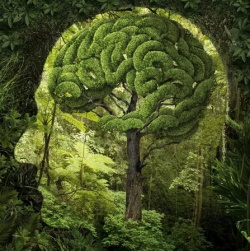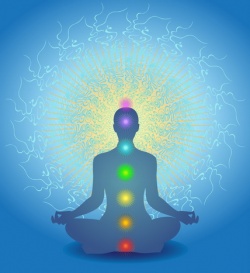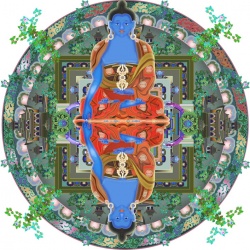Difference between revisions of "On becoming an Arahat"
| Line 1: | Line 1: | ||
{{DisplayImages|100|3058|915|993|2392}} | {{DisplayImages|100|3058|915|993|2392}} | ||
<poem> | <poem> | ||
| − | During the [[life]] of the [[Lord Buddha]], many of His [[disciples]] became [[Arahats]] (also sometimes spelled [[Arhat]], [[Arahant]], [[Arhant]]). Among them were the first Five [[monks]], [[Shariputra]], [[Maudgalyayana]] and the [[Buddha's]] own father, [[Shuddhodana]], to [[name]] only a few. | + | During the [[life]] of the [[Lord Buddha]], many of His [[disciples]] became [[Arahats]] (also sometimes spelled [[Arhat]], [[Arahant]], [[Arhant]]). Among them were the first Five [[monks]], [[Shariputra]], [[Maudgalyayana]] and the [[Buddha's]] [[own]] father, [[Shuddhodana]], to [[name]] only a few. |
The [[Arahat]] is the "Perfected One" who has overcome The [[Three Poisons]] of [[Desire]], [[Hatred]] and [[Ignorance]]. At the end of the {{Wiki|present}} [[life]], he is no longer [[reborn]]. In other words, he is finally freed from the [[suffering]] of [[existence]] in the [[cycle of birth and death]], and attains [[Nirvana]]. | The [[Arahat]] is the "Perfected One" who has overcome The [[Three Poisons]] of [[Desire]], [[Hatred]] and [[Ignorance]]. At the end of the {{Wiki|present}} [[life]], he is no longer [[reborn]]. In other words, he is finally freed from the [[suffering]] of [[existence]] in the [[cycle of birth and death]], and attains [[Nirvana]]. | ||
| − | When a [[person]] realizes that there is no lasting [[happiness]] and freedom whenever he may be [[reborn]] within the [[cycle of birth and death]], he will strive to attain the goal of [[Nirvana]]. The way of the [[Arhat]] is the [[path]] leading to this goal. The [[Arahat]] attains the goal of [[Nirvana]] by following strictly the [[three ways]] of practice, that is, [[Good Conduct]], [[Mental Development]] and [[Wisdom]]. | + | When a [[person]] realizes that there is no lasting [[happiness]] and freedom whenever he may be [[reborn]] within the [[cycle of birth and death]], he will strive to attain the goal of [[Nirvana]]. The way of the [[Arhat]] is the [[path]] leading to this goal. The [[Arahat]] attains the goal of [[Nirvana]] by following strictly the [[three ways]] of [[practice]], that is, [[Good Conduct]], [[Mental Development]] and [[Wisdom]]. |
[[Good Conduct]]: [[Purifying Body]], {{Wiki|Speech}} and [[Mind]] | [[Good Conduct]]: [[Purifying Body]], {{Wiki|Speech}} and [[Mind]] | ||
| − | The would be [[Arahat]] achieves perfect [[purity]] of the three types of [[Action]] of [[Body]], [[Action]] of {{Wiki|Speech}} and [[Action]] of [[Mind]] ([[Karma]]) by strict [[observance]] of The [[Five Precepts]] (Avoiding killing, [[stealing]], {{Wiki|sexual}} {{Wiki|misconduct}}, telling lies and taking of [[intoxicants]]) and by avoiding the [[Ten Unwholesome Actions]], also known as the [[Ten Grave Precepts]] (killing, [[stealing]] , {{Wiki|sexual}} {{Wiki|misconduct}}, telling lies, tale bearing, harsh {{Wiki|speech}}, idle talk, [[greed]], [[anger]] and [[wrong views]]). | + | The would be [[Arahat]] achieves {{Wiki|perfect}} [[purity]] of the three types of [[Action]] of [[Body]], [[Action]] of {{Wiki|Speech}} and [[Action]] of [[Mind]] ([[Karma]]) by strict [[observance]] of The [[Five Precepts]] (Avoiding {{Wiki|killing}}, [[stealing]], {{Wiki|sexual}} {{Wiki|misconduct}}, telling lies and taking of [[intoxicants]]) and by avoiding the [[Ten Unwholesome Actions]], also known as the [[Ten Grave Precepts]] ({{Wiki|killing}}, [[stealing]] , {{Wiki|sexual}} {{Wiki|misconduct}}, telling lies, tale bearing, harsh {{Wiki|speech}}, idle talk, [[greed]], [[anger]] and [[wrong views]]). |
| − | By avoiding the first three [[unwholesome actions]] of killing, [[stealing]] and {{Wiki|sexual}} {{Wiki|misconduct}}, he purifies his [[body]]. By avoiding the four [[unwholesome actions]] of telling lies, tale-bearing, harsh {{Wiki|speech}} and idle talk, he purifies his {{Wiki|speech}}. Finally, by avoiding [[greed]], [[anger]] and [[wrong views]], he purifies his [[mind]]. | + | By avoiding the first three [[unwholesome actions]] of {{Wiki|killing}}, [[stealing]] and {{Wiki|sexual}} {{Wiki|misconduct}}, he purifies his [[body]]. By avoiding the four [[unwholesome actions]] of telling lies, tale-bearing, harsh {{Wiki|speech}} and idle talk, he purifies his {{Wiki|speech}}. Finally, by avoiding [[greed]], [[anger]] and [[wrong views]], he purifies his [[mind]]. |
| − | However, Good Conduct through perfect [[discipline]] of [[body, speech and mind]] only lays the foundation for the [[path]] leading to [[Nirvana]]. It prepares the way for the [[cultivation]] of [[Mental Development]] and [[Wisdom]]. According to the [[teaching]] of the [[Noble Eightfold Path]], [[Mental Development]] comprises [[right effort]], [[right mindfulness]] and [[right meditation]]. | + | However, [[Good Conduct]] through {{Wiki|perfect}} [[discipline]] of [[body, speech and mind]] only lays the foundation for the [[path]] leading to [[Nirvana]]. It prepares the way for the [[cultivation]] of [[Mental Development]] and [[Wisdom]]. According to the [[teaching]] of the [[Noble Eightfold Path]], [[Mental Development]] comprises [[right effort]], [[right mindfulness]] and [[right meditation]]. |
[[Mental Development]]: Practising [[Mindfulness]] and [[Meditation]] | [[Mental Development]]: Practising [[Mindfulness]] and [[Meditation]] | ||
| Line 22: | Line 22: | ||
[[Concentration]] Leading to [[Absorption]] | [[Concentration]] Leading to [[Absorption]] | ||
| − | The purpose of [[meditation]] is to develop the power of [[concentration]]. Like a sharpened knife that can cut easily through a solid [[object]], the [[concentrated]] [[mind]] is able to see things as they really are. At that point, the [[meditator]] gains [[insight]] into [[the three characteristics of existence]]. He [[understands]] perfectly that all things are [[impermanent]], involved in [[suffering]] and impersonal. For the first [[time]], he gets a glimpse of [[Nirvana]] and is on the threshold of becoming an [[Arahat]]. | + | The {{Wiki|purpose}} of [[meditation]] is to develop the power of [[concentration]]. Like a sharpened knife that can cut easily through a solid [[object]], the [[concentrated]] [[mind]] is able to see things as they really are. At that point, the [[meditator]] gains [[insight]] into [[the three characteristics of existence]]. He [[understands]] perfectly that all things are [[impermanent]], involved in [[suffering]] and {{Wiki|impersonal}}. For the first [[time]], he gets a glimpse of [[Nirvana]] and is on the threshold of becoming an [[Arahat]]. |
[[Mindfulness]] Leading to [[Insight]] | [[Mindfulness]] Leading to [[Insight]] | ||
| − | The [[development]] of [[Mindfulness]] Leading to [[Insight]] doesn't always come all at once, but in a series of flashes. With [[gradual progress]] on the [[path]], these flashes of [[insight]] come more frequently and are more sustained. Eventually, one is able to [[experience]] continuously the light of [[Wisdom]]. | + | The [[development]] of [[Mindfulness]] Leading to [[Insight]] doesn't always come all at once, but in a series of flashes. With [[gradual progress]] on the [[path]], these flashes of [[insight]] come more frequently and are more sustained. Eventually, one is able to [[experience]] continuously the {{Wiki|light}} of [[Wisdom]]. |
This [[gradual progress]] towards achieving [[Wisdom]] is like the progress a child makes when {{Wiki|learning}} a skill such as riding a bicycle. When he first begins to ride, he can only maintain his [[balance]] for a short distance. Gradually, as he becomes more accustomed to the new [[experience]], he can travel longer distances until eventually he is able to ride a bicycle naturally and almost without [[effort]]. | This [[gradual progress]] towards achieving [[Wisdom]] is like the progress a child makes when {{Wiki|learning}} a skill such as riding a bicycle. When he first begins to ride, he can only maintain his [[balance]] for a short distance. Gradually, as he becomes more accustomed to the new [[experience]], he can travel longer distances until eventually he is able to ride a bicycle naturally and almost without [[effort]]. | ||
| Line 42: | Line 42: | ||
(2) [[doubt]] in the ability of the [[Triple Gem]] to lead him towards the goals; | (2) [[doubt]] in the ability of the [[Triple Gem]] to lead him towards the goals; | ||
| − | (3) the mistaken [[belief]] that [[moral]] rules and [[ascetic]] [[rites]] alone are sufficient to lead a [[person]] to [[Enlightenment]]. (Silabbata Paramasa) | + | (3) the mistaken [[belief]] that [[moral]] {{Wiki|rules}} and [[ascetic]] [[rites]] alone are sufficient to lead a [[person]] to [[Enlightenment]]. (Silabbata Paramasa) |
On [[attaining]] this first stage, the would be [[Arahat]] will no longer be [[reborn]] in any of the [[lower realms]] of [[existence]]. He will be [[reborn]] no more than seven times in the [[human]] or [[heavenly]] plans of [[existence]] before he attains [[Nirvana]]. | On [[attaining]] this first stage, the would be [[Arahat]] will no longer be [[reborn]] in any of the [[lower realms]] of [[existence]]. He will be [[reborn]] no more than seven times in the [[human]] or [[heavenly]] plans of [[existence]] before he attains [[Nirvana]]. | ||
| Line 72: | Line 72: | ||
(10) [[ignorance]]. | (10) [[ignorance]]. | ||
| − | The career of the [[Arahat]] is like the career of a [[student]] in that [[development]] is measured by the [[highest]] stage or level he has achieved so far. When a secondary school [[student]] progress in stages from secondary One to Secondary Four, his [[knowledge]] and [[mastery]] of skill increase with each higher level achieved. Eventually, he graduates from school when he passes his final year examinations. In the same way, the would be [[Arahat]] overcomes more and more of the [[fetters]] at each higher stage of his [[development]]. When he successfully passes the fourth stage, he reaches the end of his career and is no longer [[subject]] to [[Rebirth]]. | + | The career of the [[Arahat]] is like the career of a [[student]] in that [[development]] is measured by the [[highest]] stage or level he has achieved so far. When a secondary school [[student]] progress in stages from secondary One to Secondary Four, his [[knowledge]] and [[mastery]] of skill increase with each higher level achieved. Eventually, he graduates from school when he passes his final year examinations. In the same way, the would be [[Arahat]] overcomes more and more of the [[fetters]] at each higher stage of his [[development]]. When he successfully passes the [[fourth stage]], he reaches the end of his career and is no longer [[subject]] to [[Rebirth]]. |
| − | However, even in light of all of the above, The Ten [[Fetters]] and other various [[offerings]], it should be remembered true [[Enlightenment]], as [[experienced]] by the [[Buddha]] and transmitted through the [[patriarchs]], is {{Wiki|independent}} of [[verbal]] explanations, including the record of the [[Buddha's teachings]] (i.e., [[scriptures]]) and later [[doctrinal]] elaborations. (source) | + | However, even in {{Wiki|light}} of all of the above, The Ten [[Fetters]] and other various [[offerings]], it should be remembered true [[Enlightenment]], as [[experienced]] by the [[Buddha]] and transmitted through the [[patriarchs]], is {{Wiki|independent}} of [[verbal]] explanations, including the record of the [[Buddha's teachings]] (i.e., [[scriptures]]) and later [[doctrinal]] elaborations. (source) |
| Line 83: | Line 83: | ||
No [[dependence]] upon words and letters; | No [[dependence]] upon words and letters; | ||
Direct pointing to the [[soul]] of man: | Direct pointing to the [[soul]] of man: | ||
| − | [[Seeing]] into one's own [[nature]] and [[attainment of Buddhahood]] | + | [[Seeing]] into one's [[own]] [[nature]] and [[attainment of Buddhahood]] |
The [[Sixth Patriarch]] of [[Chinese Zen]] [[Hui Neng]] | The [[Sixth Patriarch]] of [[Chinese Zen]] [[Hui Neng]] | ||
| − | Remember, as well, underscoring in [[essence]] What The [[Buddha]] Said, Dr. [[Walpola Rahula]] writes in his [[book]] "What the [[Buddha]] Taught" (pp. 2-3), extrapolating from the [[Kalama Sutra]] how far the [[Buddha]] went: "He told the [[bhikkhus]] that a [[disciple]] should examine even the [[Tathagata]] ([[Buddha]]) himself, so that he (the [[disciple]]) might be fully convinced of the true value of the [[teacher]] whom he followed." | + | Remember, as well, underscoring in [[essence]] What The [[Buddha]] Said, Dr. [[Walpola Rahula]] writes in his [[book]] "What the [[Buddha]] [[Taught]]" (pp. 2-3), extrapolating from the [[Kalama Sutra]] how far the [[Buddha]] went: "He told the [[bhikkhus]] that a [[disciple]] should examine even the [[Tathagata]] ([[Buddha]]) himself, so that he (the [[disciple]]) might be fully convinced of the true value of the [[teacher]] whom he followed." |
Revision as of 20:49, 8 March 2015
During the life of the Lord Buddha, many of His disciples became Arahats (also sometimes spelled Arhat, Arahant, Arhant). Among them were the first Five monks, Shariputra, Maudgalyayana and the Buddha's own father, Shuddhodana, to name only a few.
The Arahat is the "Perfected One" who has overcome The Three Poisons of Desire, Hatred and Ignorance. At the end of the present life, he is no longer reborn. In other words, he is finally freed from the suffering of existence in the cycle of birth and death, and attains Nirvana.
When a person realizes that there is no lasting happiness and freedom whenever he may be reborn within the cycle of birth and death, he will strive to attain the goal of Nirvana. The way of the Arhat is the path leading to this goal. The Arahat attains the goal of Nirvana by following strictly the three ways of practice, that is, Good Conduct, Mental Development and Wisdom.
Good Conduct: Purifying Body, Speech and Mind
The would be Arahat achieves perfect purity of the three types of Action of Body, Action of Speech and Action of Mind (Karma) by strict observance of The Five Precepts (Avoiding killing, stealing, sexual misconduct, telling lies and taking of intoxicants) and by avoiding the Ten Unwholesome Actions, also known as the Ten Grave Precepts (killing, stealing , sexual misconduct, telling lies, tale bearing, harsh speech, idle talk, greed, anger and wrong views).
By avoiding the first three unwholesome actions of killing, stealing and sexual misconduct, he purifies his body. By avoiding the four unwholesome actions of telling lies, tale-bearing, harsh speech and idle talk, he purifies his speech. Finally, by avoiding greed, anger and wrong views, he purifies his mind.
However, Good Conduct through perfect discipline of body, speech and mind only lays the foundation for the path leading to Nirvana. It prepares the way for the cultivation of Mental Development and Wisdom. According to the teaching of the Noble Eightfold Path, Mental Development comprises right effort, right mindfulness and right meditation.
Mental Development: Practising Mindfulness and Meditation
There are various methods by which would-be Arahat gradually disciplines and controls his mind so that it remains calm, undistracted and aware. Two of the best known methods are Concentration Leading to Absorption and Mindfulness Leading to Insight.
Concentration Leading to Absorption
The purpose of meditation is to develop the power of concentration. Like a sharpened knife that can cut easily through a solid object, the concentrated mind is able to see things as they really are. At that point, the meditator gains insight into the three characteristics of existence. He understands perfectly that all things are impermanent, involved in suffering and impersonal. For the first time, he gets a glimpse of Nirvana and is on the threshold of becoming an Arahat.
Mindfulness Leading to Insight
The development of Mindfulness Leading to Insight doesn't always come all at once, but in a series of flashes. With gradual progress on the path, these flashes of insight come more frequently and are more sustained. Eventually, one is able to experience continuously the light of Wisdom.
This gradual progress towards achieving Wisdom is like the progress a child makes when learning a skill such as riding a bicycle. When he first begins to ride, he can only maintain his balance for a short distance. Gradually, as he becomes more accustomed to the new experience, he can travel longer distances until eventually he is able to ride a bicycle naturally and almost without effort.
The Four Stages of Becoming an Arahat
Progress on the path of an Arahat is measured by the person's ability to weaken or eliminate The Ten Fetters which bind him to the cycle of birth and death, and which keep him from attaining Nirvana. there are four recognizable stages which mark his progress along the path. These are explained in relation to the Ten Fetters below.
The First Stage:
At the first stage is the Stream-winner (Sotapanna), that is, one who has entered the "stream" that eventually leads to the "Ocean of Nirvana". When he is at this stage, his insight is powerful enough to remove the first three fetters, namely:
(1) the belief in the existence of permanent self;
(2) doubt in the ability of the Triple Gem to lead him towards the goals;
(3) the mistaken belief that moral rules and ascetic rites alone are sufficient to lead a person to Enlightenment. (Silabbata Paramasa)
On attaining this first stage, the would be Arahat will no longer be reborn in any of the lower realms of existence. He will be reborn no more than seven times in the human or heavenly plans of existence before he attains Nirvana.
The Second Stage:
As he makes further progress and perfects his insight still more, he reaches the second stage of the Once-Returner (Sakadagami). After this life, he will be reborn only once more as a human being. In that rebirth, he would attain Nirvana. At this stage, he has also succeeded in weakening the fourth and fifth fetters. These are:
(4) attachment to sensual desire;
(5) ill will.
The Third Stage:
The third stage is that of the Once-returner, the Anãgãmi. At this stage, he completely removes the fourth and fifth fetters of attachment to sensual desire and ill will. The Non-Returner will no longer be reborn in the human realm; he will be reborn in one of the Pure Abodes in the heavens where he will attain Nirvana. At this stage, the first five fetters have been totally removed.
The Fourth Stage:
At the fourth stage, he makes the final advance towards becoming a Perfect One (Arahat) who attains Nirvana because he has broken all the Ten Fetters, the last five of which are:
(6) desire for existence in the worlds of Form;
(7) desire for existence in the Formless Worlds;
(8) conceit;
(9) restlessness;
(10) ignorance.
The career of the Arahat is like the career of a student in that development is measured by the highest stage or level he has achieved so far. When a secondary school student progress in stages from secondary One to Secondary Four, his knowledge and mastery of skill increase with each higher level achieved. Eventually, he graduates from school when he passes his final year examinations. In the same way, the would be Arahat overcomes more and more of the fetters at each higher stage of his development. When he successfully passes the fourth stage, he reaches the end of his career and is no longer subject to Rebirth.
However, even in light of all of the above, The Ten Fetters and other various offerings, it should be remembered true Enlightenment, as experienced by the Buddha and transmitted through the patriarchs, is independent of verbal explanations, including the record of the Buddha's teachings (i.e., scriptures) and later doctrinal elaborations. (source)
IN OTHER WORDS:
A special transmission outside the scriptures;
No dependence upon words and letters;
Direct pointing to the soul of man:
Seeing into one's own nature and attainment of Buddhahood
The Sixth Patriarch of Chinese Zen Hui Neng
Remember, as well, underscoring in essence What The Buddha Said, Dr. Walpola Rahula writes in his book "What the Buddha Taught" (pp. 2-3), extrapolating from the Kalama Sutra how far the Buddha went: "He told the bhikkhus that a disciple should examine even the Tathagata (Buddha) himself, so that he (the disciple) might be fully convinced of the true value of the teacher whom he followed."
"Do not go upon what has been acquired by repeated hearing; nor upon tradition; nor upon rumor; nor upon what is in a scripture; nor upon surmise; nor upon an axiom; nor upon specious reasoning; nor upon a bias towards a notion that has been pondered over; nor upon another's seeming ability; nor upon the consideration that 'The monk is your teacher.' "




